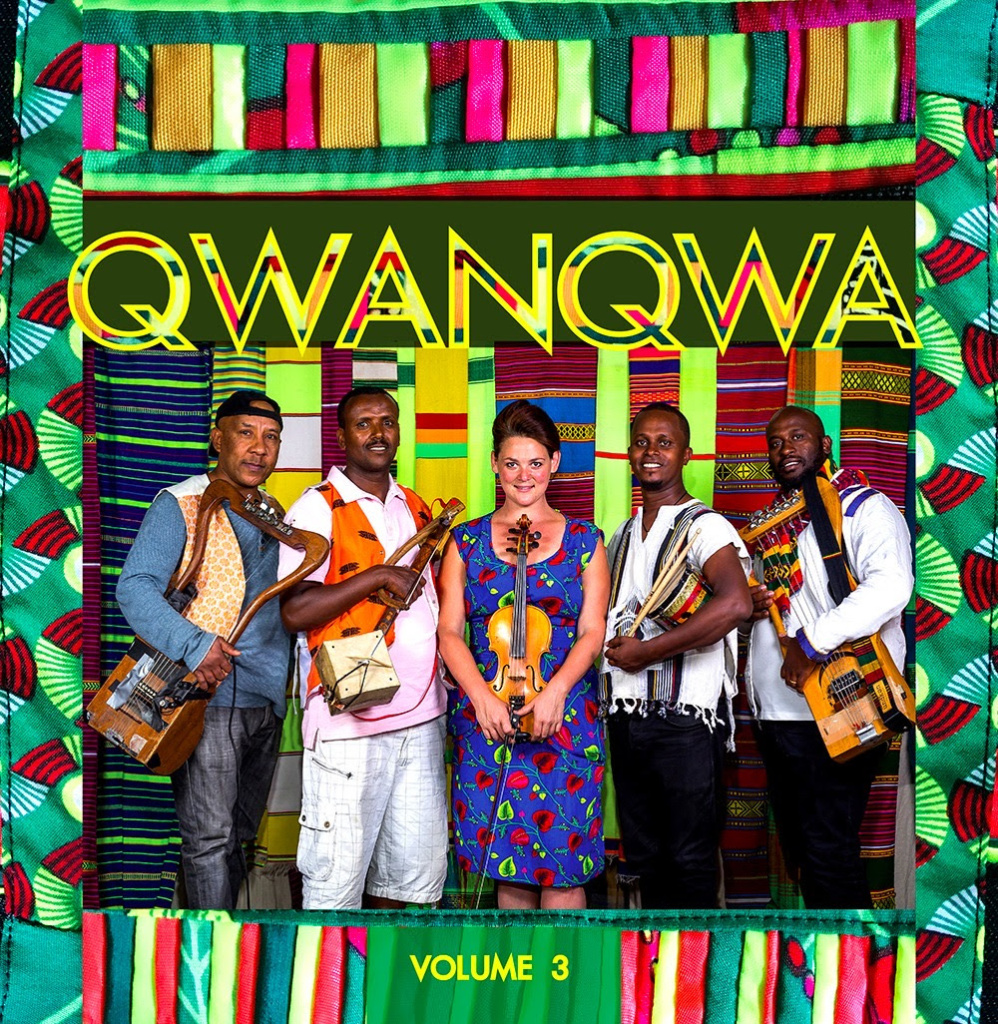QWANQWA is a five-piece ensemble based in Addis Ababa, dedicated to furthering Ethiopia’s unique string traditions. Inspired by a shared passion for Ethiopian music, the group brings together some of the most accomplished traditional players in the country; creating a space to explore new sounds and break the rules in a very traditional musical culture.
The ensemble was founded in 2012 by American violinist Kaethe Hostetter, who first worked in Ethiopian music as a founding member of critically acclaimed Debo Band. Since relocating to Ethiopia’s capital, Addis Ababa, in 2009, she’s honed her sound and dived deep into the culture, playing in numerous exploratory and professional projects. As part of her immersion in Ethiopian music and culture, Hostetter brought together some of the most accomplished players in Addis Ababa’s music scene. Since their 2012 debut, QWANQWA has merged the richness and diversity of rooted tradition with a modern, experimental sensibility, inspired improvisation, and a mission to transcend genres and blur boundaries.
Their third studio album, Volume 3, will be released internationally on vinyl, CD, and digital platforms on September 11th, 2020, at midnight, just in time for Ethiopian New Years (2013 on the Ethiopian Calendar).
In keeping with the inclusive spirit of QWANQWA’s previous two albums, Volume 3 reaches deep into Ethiopia’s regional traditions and beyond its borders, taking inspiration from the country’s diverse ethnic population and neighbors to the North, West, and East. Recorded in Addis Ababa over the course of a long weekend in February 2017, the album is a snapshot of a dynamic band in evolution.
A long time in the making, QWANQWA Volume 3 features the band’s pre-2018 repertoire and lineup — Endris Hassen on one-string mesenko fiddle, Mesele Asmamaw on vocals and electric krar lyre, Kaethe Hostetter on five string electric violin, Bubu Teklemariam on bass krar, Selamnesh Zemene (vocalist), and Misale Leggesse on the goat-skinned drum called kebero. “The music on this album reflects the repertoire we were working with at the time,” says QWANQWA bandleader Katehe Hostetter. “The material was sourced from regions beyond Ethiopia’s borders, including an Eritrean tribal chant transformed by our arrangement, and a Somali pop song. We were inspired by the infinite musical variety of Ethiopia and its neighbors, and dove deep into the traditions beyond the five most well known ethnic groups. Thanks to our band members’ Endris Hassen and Misale Legesse’s encyclopedic knowledge, we were able to spotlight these tiny pockets of overlooked musical traditions.” “Since the recording of this album,” Kaethe adds, “Addis Ababa has dipped in and out of a State of Emergency due to ethnic tensions, but we’ve stayed resilient and creative, and our message of one unified Ethiopia, that celebrates and includes all 84 official ethnic groups, has never felt more poignant.”
The first track, “Ago”, welcomes the listener into the evocative world of QWANQWA, with a trio arrangement of a melody from the Northern people, in which you’ll hear the violin evoking the simple Shepard’s flute. “Blen“ is based on an Eritrean melody of the Blen tribe, that’s traditionally accompanied by a circle of dancing young men, dressed in white and spinning like dervishes. “Somali” is a cover of a Dur Dur Band tune, with an extended section where Mesele and Kaethe trade melody and soloing. “Serg” is a 20 minute wedding song medley that is meant to invoke the trance-like experience of an Amhara wedding.
Contact Kaethe Hostetter: kaethehostetter@gmail.com
(QWANQWA, left to right: Bubu Teklemariam, Endris Hassen, Selamnesh Zemene, Misale Legesse, Kaethe Hostetter)

